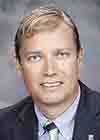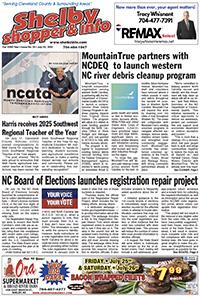 Michael Ferrell Four times a week, 41-year-old Belwood resident Trevor Walker spends more than three hours hooked up to a dialysis machine in his home. The Shelby High graduate seemed perfectly healthy until just a few years ago when he started having problems with his blood pressure. Even after treatment, the condition seemed hard to control.
"Then my doctor referred me to a kidney specialist, and we found out that I had kidney disease - one kidney was half gone before I found out," Walker says. He was diagnosed with IgA nephropathy, also known as Berger's disease, a kidney disease that occurs when antibodies lodge in the kidneys. This results in inflammation that hinders the kidneys' ability to filter wastes from the blood.
Since his diagnosis, Walker has had to cut back on his work hours at J. Morgan Company in Shelby. "I still work part time. I'm lucky in that the disease has not been really aggressive," Walker says.
Even so, three-and-a-half hour sessions four days a week can be draining. Ongoing dialysis wears and tears on the vein, not to mention the time and physical and mental strain of constantly needing medical treatment. Walker's ultimate hope is a kidney transplant. But most people on the transplant list wait at least three years to get a match, and Walker has only been on the list for nine months.
Because of health issues, no one in Walker's immediate family can be considered as a possible donor.
One person who would love to donate a kidney to Walker is his friend and former roommate Michael Ferrell. But Ferrell already donated one of his kidneys several years ago, to a local child who was in need.
"I think a lot of people think they might be willing to do it, but they think that they won't be a match," says Ferrell. "But now the Living Donor program allows for swaps."
What Ferrell is referring to is the Carolinas HealthCare System's Kidney Paired Exchange program. If a potential kidney transplant recipient and his/her donor are found to be incompatible, the program offers an option to find another such recipient and donor who are in the same situation. "The hope is then to be able to 'swap' kidneys so both pairs receive a healthy, compatible kidney," according to information provided by the Carolinas Healthcare Living Donor Office.
"As I understand it, they can do up to a three-way swap from places all over the United States," says Ferrell.
Ferrell admits that it takes a "certain kind of person" to donate a kidney, but it is an experience that he would go through again "in a heartbeat," he says. The child that received Ferrell's kidney died a month after the transplant, but doctors did not believe that it was related to the transplant but rather to the underlying disease in the child's body. "What happened afterward had nothing to do with the donation, and I am very glad I did it."
Ferrell stresses that now, three years after his donation, he is living a normal life, and that, if anything, he is in better health than he was before.
"Your second kidney is a spare, and, after the donation, the kidney that is left doubles in size," he says. "Today I think I live an even better life than before because I have an awareness and an understanding that I didn't have before."
All medical expenses for a kidney donation are covered by the recipient's insurance. "There is no out-of-pocket cost for the donor," says Ferrell.
In fact, if a donor later develops any kind of medical problem with their one remaining kidney, they are assured of being put at the top of the list for a transplant themselves, Ferrell says.
"It just blew my mind how in-depth the doctors and coordinators were in every aspect of this experience," Ferrell says. "They really put you through a ringer of tests to be sure that you are physically, mentally, emotionally and spiritually able to do it.
"Even the morning of the surgery they came in and said that if I wanted to change my mind they would take the blame and say that there was another reason why the surgery couldn't happen. They go out of their way to make sure the donor is under no pressure or coercion."
"The whole experience was such an eye-opener," Ferrell concludes. "Whenever I have the chance I talk about it and urge people to consider being a living donor. It does work. It works every day."
Anyone interested in learning more about being a living donor can contact Ferrell by phone at 704-300-6501 or by email at michael.ferrell@ncfbins.com.
By April Hoyle Shauf
Special to Shelby Shopper |





